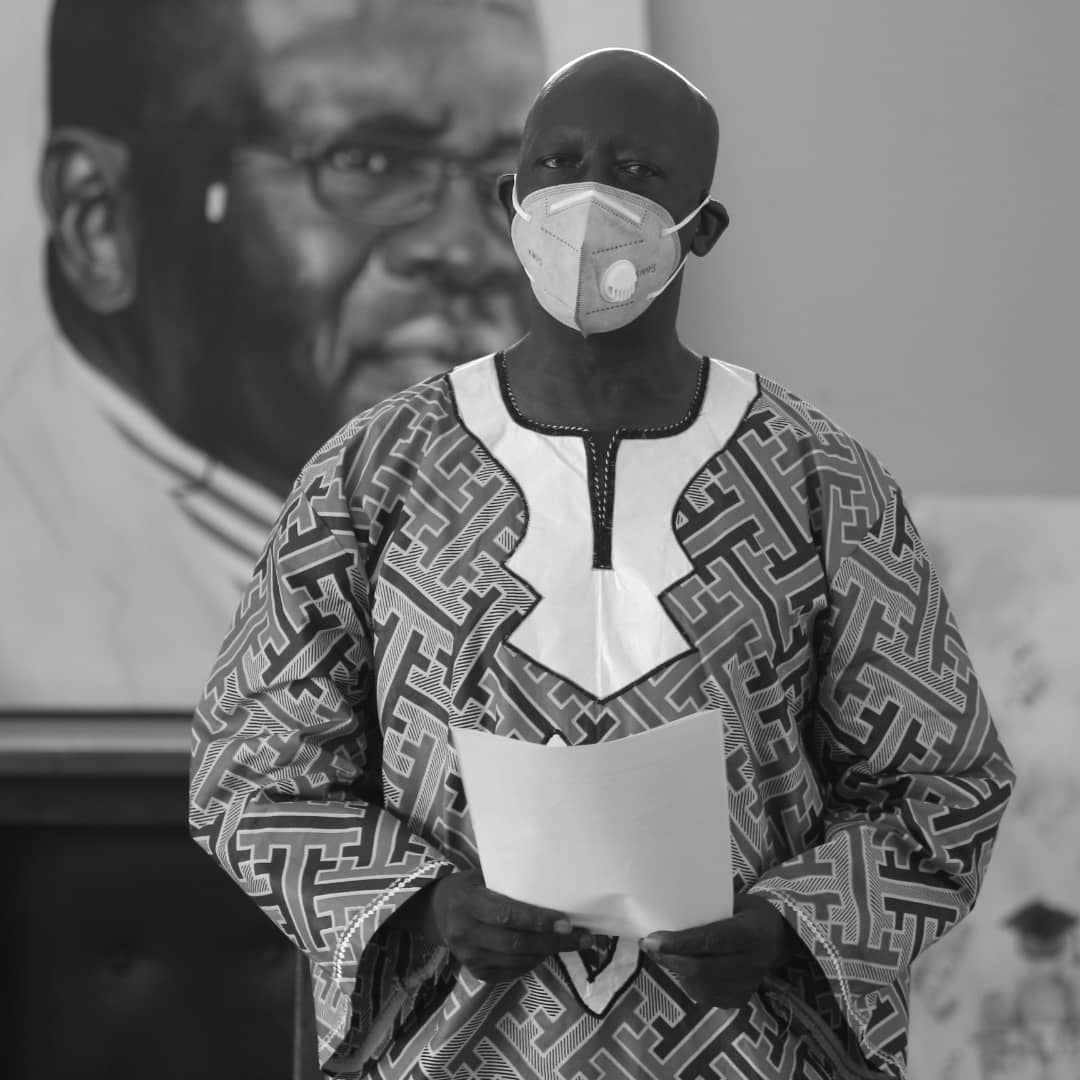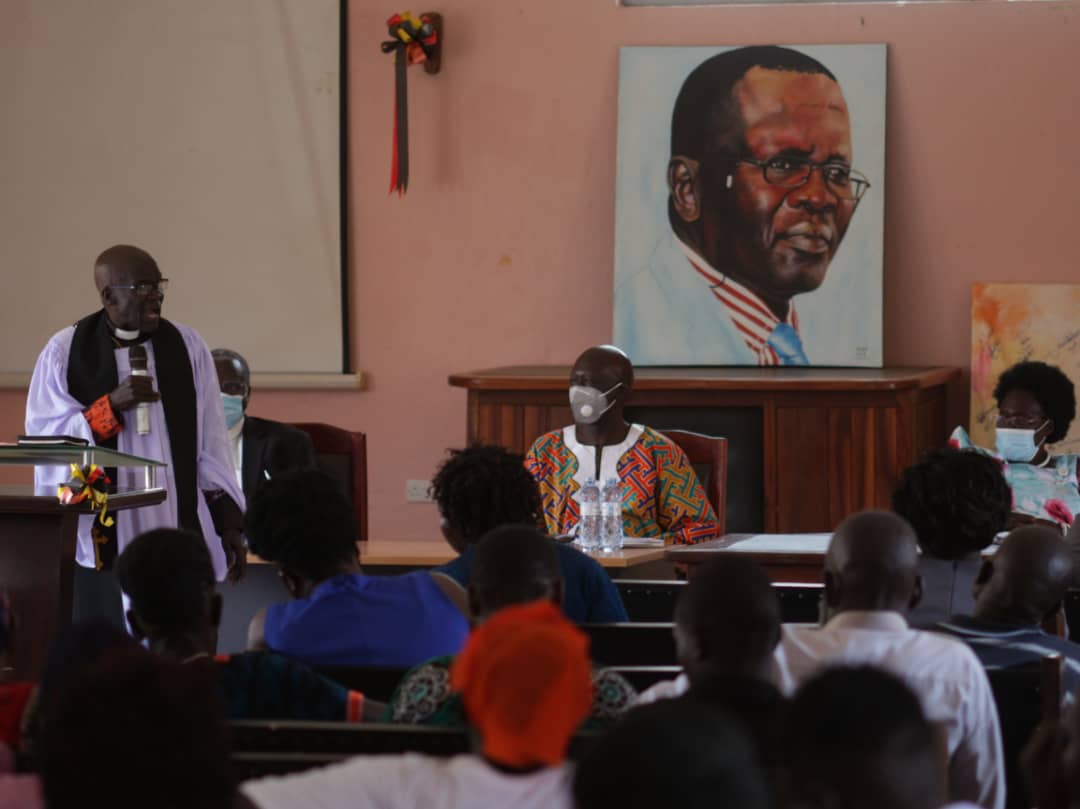TRIBUTE: Michael Ocan was a believer in education as a transformational agent
On Wednesday, February 22, 2017, Uganda lost one of its foremost educationists, Michael Ocan. He was much more than an educationist as the tribute his son Jimmy Acellam Odoki penned here attests.
Five years after Ocan’s untimely demise, family, friends and peers gathered at Gulu District Council Hall to remember the man who touched lives not just in the education sector but politically, culturally and socially.
Half a decade after Ocan’s passing, his legacy is becoming more appreciated and none spoke more eloquently for its influence than Professor Ogenga Otunnu during this February 21, 2022 meeting.
 Prof Otunnu delivers memorial lecture.
Prof Otunnu delivers memorial lecture.
Professor Otunnu, a DePaul University, Chicago, USA lecturer, specializes in Refugee & Forced Migration Studies, Peace & Conflict Studies, African History. After months of careful study and consultation, Otunnu felt ready to put pen to paper to celebrate the many sided talents Ocan brought to his community and Uganda in this dedicated memorial lecture.
MEMORIAL LECTURE
By Prof Ogenga Otunnu
Ladit Michael Ocan is fondly and respectfully referred to by the title of Lapwony (teacher or Mwalimu) by many people who knew and know him.
Lapwony Michael Ocan’s Philosophy of Education for Liberation.
Hon. Mego Betty Aol Ocan, the family of Lapwony Michael Ocan and distinguished guests, sisters and brothers. I am honored and humbled to share with you my reading of Ladit Michael Ocan’s philosophy of education for liberation, which is informed by and rests on indigenous Acoli, Luo and African philosophy of education.
His philosophy of education for liberation focuses on the transformation of both the individual and the society, psychologically, socially, physically, spiritually, intellectually, economically and politically.
It is education that is intentionally inclusive, communal, empowering, relevant, pro-active, problem-solving, integrated and holistic. It is a philosophy that critiques both the colonial and neo-colonial systems of education in Uganda—systems deliberately created to reproduce and sustain values of exploitation, oppression, fragmentation, dependency, individualism, subservience, and inequality.
His philosophy of education for liberation is a clarion call for socio-economic and political transformation of Acoliland in the light of the realities of the harrowing and persistent poverty and profound social dislocation. His philosophy of Education for liberation is similar to Mwalimu Nyerere and Paulo Freire (Pedagogy of the Oppressed). His philosophy of education for liberation has universal relevance.
The presentation is divided into four related sections. The first section is a brief account of Lapwony Michael Ocan’s educational career, which is important for understanding the origins and context of his philosophy of education for liberation.
The second section is an overview critique of both colonial and neo-colonial systems of education which calls for education for liberation. This is followed by suggestions about the need for reorientation of education. The final section describes education for liberation.

A Brief Account of Lapwony Michael Ocan’s Educational Career:
In the Acoli tradition, names have meanings. They speak to specific moments, experiences, imaginations, histories, petitions, prayers of the family and the larger community of which the family is an integral part.
Ocan means challenges, tribulations. The family and the community engage in collective education, based on well-established and recognized process of interrogation, and provide a comprehensive situational analysis of the challenges and/or tribulations. Thereafter, they work together to identify and reassess possible opportunities to overcome the challenges and transform both the family and the community.
As an integral member of the family and the community, Ocan saw and embraced education as a problem-solving process that should liberate not only him and his family but also the larger community.
Accordingly, together with the encouragement and support of the family and the community, he went to school and performed so well that he ended up going to the best schools in the country and successfully completed his university education at Makerere University.
Lapwony Ocan was a man of faith. Here, education for liberation is spiritual as well.
- God created us in his own likeness: not a God of poverty, injustices, exploitation, arrogance.
- Every space, including the church, is space for education for liberation.
- Education for liberation serves others: How crucial it is to be a teacher-servant. When we serve others, we are serving God. The first place to serve others is home (Jerusalem): partner, children, parents, family members.
- The second place to serve others is communal place of fellowship and/or worship: your church, mosque, temple, religious/spiritual shrine. Here, one must use the skills and interests God has given her/him to serve the community of faith.
- Third place to serve others in the community is the place of learning or school.
- Fourth place to serve is the larger community.
His service for others was grounded in the scripture: Mathew 25: 35-40:
Jesus communicates the importance of service to others: For I was hungry and you gave me food, I was thirsty and you gave me drink, I was a stranger and you welcomed me, I was naked and you clothed me, I was sick and you visited me, I was in prison and you came to me. Then the righteous man will answer him, saying, “Lord, when did we see you hungry and feed you, or thirsty and give you drink? And when did we see you a stranger and welcome you, or naked and clothe you? And when did we see you sick or in prison and visit you? And the King will answer them. “Truly, I say to you, as you did to one of the least of these my brothers, you did it to me.”
Service to others: “As each has received a gift, use it to serve one another, as good stewards of God’s varied grace” (1 Peter 4: 10).
His Critique of Colonial and Post-colonial Education:
- That colonial and post-colonial education, including organizational structures of schools, curriculum and syllabi, are largely alien, irrelevant and elitist and cater for very small proportion of those who are able to complete formal schooling and become teachers, engineers, doctors and other professionals. The majority of participants will never become professionals.
- That colonial and post-colonial education disrupt the collective people-centered forms of indigenous and pre-colonial education and education for liberation by presenting formal schooling as synonymous with education. In these exclusive forms of education, people are judged and employed on the basis of paper qualification and/or discriminatory networks.
- That colonial and post-colonial education systems encourage parasitic individualism and alienate participants from the society that contributes to their being and subsidizes their training. P’Tek, Song of Lawino, Fanon, Black Skin, White Mask: Alienation, arrogance, irrelevance, identity crisis, skin coloring.
- That colonial and post-colonial education breed contempt for manual work in a predominantly low input agricultural society.
- That colonial and post-colonial education do not promote social, ethical and moral values that serve the common good and encourage social goals of living and working together.
Urgent Need to Reorient Education:
- Reorient the goals, values and structure of education for the liberation of the primary participants and the larger society.
- Education must inculcate a sense of commitment to the society.
- Education should not be designed to produce robots, who work hard but never question the quality and relevant of education, never question local and national policies, never questions what the leaders are doing with their resources. Rather, it must encourage rigorous inquiry, debates; an ability to learn from what others do, rejecting or adapting it to the needs of the society; it must encourage confidence in one’s position as a free and equal member of the society, who values others and is valued by others.
- Our curriculum and syllabi must focus on the majority of our children: the skills and values they need to become productive, self-reliant and responsible members of the society.
- We must change curriculum that emphasizes the importance of formal examinations which merely assess a person’s ability to learn facts.
- Schools must become social and economic centres for local communities.
Education for Liberation
- Education for liberation promotes self-reliance, not dependence, both individually and collectively.
- Education for liberation should equip the person to apply the knowledge in solving challenges facing the society.
- Those who have achieved education for liberation come back from the mountain of knowledge to the valley of challenges as an important source of liberating the society.
- Education for liberation should create competent citizens who are capable of eradicating poverty and economic dependency and embracing self-reliance and shared prosperity.
- Education for liberation insists that freedom and economic development are incompatible.
- Education for liberation will make members creators rather than skillful users of tools.
- Education for liberation transforms the person: one who is fully integrated and applies in life what s/he has learnt to transform the society.
- A liberated person is an active member of the society; s/he contributes to the society, and is aware that it is the society that educated her/him.
- A liberated person is one who uses her/his education for the benefit of the society, not as a tool for exploitation, dehumanization, humiliation and domination.
- A liberated person integrates with the masses, does not isolate from the community, and overcomes the temptation of intellectual arrogance.













